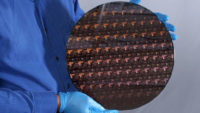IBM Research is using a semiconductor manufacturing technology featuring nanosheet components that has helped it create what it claims is the world’s first 2nm chips. The company says the chips are expected to arrive in 2024 or 2025. With 50 billion transistors on a single chip, the new processors will increase performance by 45 percent or reduce power consumption by 75 percent compared with the current technology used to make IBM server chips and Apple’s iPhone chips. Taiwan Semiconductor Manufacturing makes today’s most advanced chips, which are 5nm.
CNET reports that, “IBM’s new method uses … nanosheets, the thin, flat wires that carry electrical current across the transistor [as well as] a new design for the gate, a component that switches current on or off.” IBM’s gate technology “completely surrounds each nanosheet … to keep electrical current from leaking.”

“We have the transistor device to make it happen, and we are seeing the performance improvements,” said IBM Research director and senior vice president Dario Gil. “The entire industry is going to use this transistor technology.” IBM Research is building test chips at its Albany, New York facility, “a choice that will likely sit well with politicians eager to restore U.S. chipmaking prowess.”
It notes that, while TSMC’s 5nm process is the most advanced, “much of the industry still uses 7nm or earlier processes … [and] next in line is 3nm.” IBM’s 2nm chips leap over two generations.
Real World Insights principal analyst David Kanter revealed that leading chipmakers Intel, TSMC and Samsung, “all have their own research programs and likely already are working on gate-all-around technology.” In fact, Samsung showed it off at a conference in February, and Intel “is working on stacking multiple layers of nanosheets into each transistor.”
One complication for IBM is its partnerships with major chipmakers; “Samsung builds IBM server processors, and an IBM research alliance is part of new Intel chief executive Pat Gelsinger’s plan to turn around Intel’s years of problems.” IBM will also have to prove the new technology “works outside of a lab in high-volume manufacturing, where costs and consistency are crucial.”
Engadget reports that, “mobile devices with 2nm-based processors could have up to four times the battery life of ones with 7nm chipsets … laptops would get a speed boost from such processors, while autonomous vehicles will detect and react to objects more quickly.” The company also pointed to the impact of the 2nm chip on “data center power efficiency, space exploration, artificial intelligence, 5G and 6G and quantum computing.”
TSMC is also working on a 2nm process “and expects to go into volume production of 4nm and 3nm next year.” Apple’s M1 chip, which debuted last fall, was “the first processor based on TSMC’s 5nm technology node process.” AMD and Qualcomm still use TSMC’s 7nm chips and Intel, which uses 10nm and 14nm chips, may release 7nm processors by 2023.
Related:
U.S. Chip Startups, Long Shunned in Favor of Internet Bets, Stir Excitement Again, Reuters, 5/5/21
To Make These Chips More Powerful, IBM Is Growing Them Taller, Wired, 5/6/21

No Comments Yet
You can be the first to comment!
Sorry, comments for this entry are closed at this time.